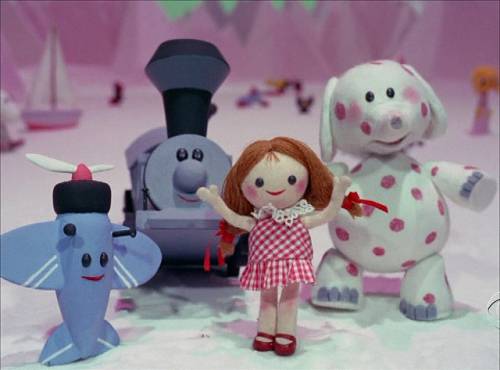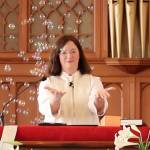Islands of Misfit Toys
Lessons from Rudolph for small churches
by Sue Washburn

A friend of mine once said the church she served was like the Island of Misfit Toys in the Christmas classic Rudolph the Red-Nosed Reindeer.
If you remember the story of Rudolph, you know that he was different, set apart from the other reindeer because of his light up nose. He was an outcast. The cool reindeer — Dasher and Dancer and Prancer and Vixen and so on — made fun of him. He was weird and odd and he didn’t fit in. Even Santa himself excludes Rudolph. So, like most of biblical heroes and prophets, Rudolph spends some time journeying in the wilderness.
He ends up on the Island of Misfit Toys with all of the broken and odd toys nobody wants, like a Charlie in the Box, a train with square wheels, the spotted elephant or a cowboy who rides an ostrich. The ruler of that island is a king who searches the earth for toys that children don’t love. He brings them to the island until someone wants the toy. The king charges Rudolph to go back and tell Santa about all of the homeless toys so they can find children who will love them.
For those of us who serve small churches, we can sometimes feel like Rudolph.
Small churches tend to be full of people we might call “characters.” People who don’t always fit in to what society expects. At first I thought the small congregation I serve was unique in this respect. We are a variety of lovable misfits, myself included.
But we are not unique. Karl Vater, author of The Grasshopper Myth says that the smaller the congregation, the more unique its personality (or personalities). Many small congregations are indeed collections of spotted elephants or Charlie-in-the-boxes.
Bigger congregations, he says, tend to exert more pressure to conform to group norms (whatever that may be). The broken toys in these congregations hide their flaws in order to assimilate with the group or they feel an unspoken message to quietly leave. The bigger the group gets, the more static and homogenous it becomes.
As a small church leader, I confess that I’ve often envied the leaders of big churches. They have lawyers and teachers and managers on the boards that lead their church. Their Dashers and Dancers and Prancers and Vixens posses the gifts and talents for a well-managed organization. Well, maybe not the Vixens…
A small church like the one I serve doesn’t always feel like it has a choice of talents for leadership. We rotate through the people who have willing hearts to serve on our boards. The top priority for discernment is, “Who is eligible this year?”
But, the good news is that God is sure to provide what we need. Even though it might not appear that way at first.
We have deacons who cannot cook, drive or do visitation, but whose prayers are as deep and loving as any pastor. We have leaders whose mobility issues make it difficult for them to go up the steps to turn on the electronics in the chancel, but who make sure that the flowers they donate go to the people who cannot come to church. We have board members who are too shaky serve communion, but who bring a knowledge of our church’s history and connections the to community that are generations deep.
In comparison to the larger, more affluent churches with able-bodied suits sitting around the table and well-organized programs, we look like a group of misfits. We are quirky and broken and don’t reflect what the world might see as success.
But God works in our weakness. When we come to the communion table or the meeting table, there’s not pressure to be something we are not. We come as ourselves, not as what other people expect to see. We come as broken people who love Jesus and want to share that love.
The end of Rudolph the Red-Nosed Reindeer is a happy one and it’s our story, too. Rudolph’s odd, red nose is the thing that makes him the most valuable, not just to Santa and the team of reindeer, but to all the toys and children. The red nose that excluded him from the reindeer games was the thing that the group needed the most during the snowstorm. His weakness was really a strength.
In the end, the beautiful toys and the broken toys are all delivered on Christmas Eve. May it be so for us as well.
 Rev. Sue Washburn is the bi-vocational pastor of Reunion Presbyterian Church in Mount Pleasant, Pennsylvania and a freelance writer. Most Christmases she has a red nose from an allergy to pine.
Rev. Sue Washburn is the bi-vocational pastor of Reunion Presbyterian Church in Mount Pleasant, Pennsylvania and a freelance writer. Most Christmases she has a red nose from an allergy to pine.